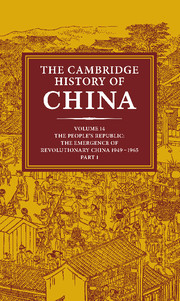Book contents
- Frontmatter
- 1 The reunification of China
- PART 1 EMULATING THE SOVIET MODEL, 1949–1957
- PART II THE SEARCH FOR A CHINESE ROAD, 1958–1965
- 7 The Great Leap Forward and the split in the Yenan leadership
- 8 The Chinese economy under stress, 1958—1965
- 9 New directions in education
- 10 The Party and the intellectuals: phase two
- 11 The Sino-Soviet split
- Bibliographical Essays
- Bibliographical essays for chapters
- Bibliography
- Appendixes: Meetings and Leaders
- Conversion Tables: pinyin and Wade-Giles
- Glossary Index
- Map 1. China’s physical features
- Map 2. PRC: political (Wade–Giles romanization)
- Map 3. PRC: political (pinyin romanization)
- References
11 - The Sino-Soviet split
from PART II - THE SEARCH FOR A CHINESE ROAD, 1958–1965
Published online by Cambridge University Press: 28 March 2008
- Frontmatter
- 1 The reunification of China
- PART 1 EMULATING THE SOVIET MODEL, 1949–1957
- PART II THE SEARCH FOR A CHINESE ROAD, 1958–1965
- 7 The Great Leap Forward and the split in the Yenan leadership
- 8 The Chinese economy under stress, 1958—1965
- 9 New directions in education
- 10 The Party and the intellectuals: phase two
- 11 The Sino-Soviet split
- Bibliographical Essays
- Bibliographical essays for chapters
- Bibliography
- Appendixes: Meetings and Leaders
- Conversion Tables: pinyin and Wade-Giles
- Glossary Index
- Map 1. China’s physical features
- Map 2. PRC: political (Wade–Giles romanization)
- Map 3. PRC: political (pinyin romanization)
- References
Summary
In 1958–64, the Sino-Soviet dispute became the overriding problem for Chinese foreign policy. During the first half of the 1950s, Peking's preoccupation with Sino-American relations had been manifest in the Taiwan problem, the Korean War, exclusion from the United Nations, and the American economic embargo. These issues were primary, involving such matters as sovereignty, national security, and economic development. Sino-Soviet relations had been in this sense a function of Sino-American relations because of China's dependence on Moscow for defense and development.
None of these issues disappeared from the agenda in Peking; however, after 1958 they became secondary to the Sino-Soviet dispute. Except for brief periods of tension in 1958 and 1962, the Taiwan Strait stabilized as a relatively inactive point of confrontation. Similarly, Korea remained divided in a status of “no war - no peace.” China's rapidly expanding relations with European, African, and Asian countries obviated much of the substantive, if not the symbolic, deprivation of remaining outside the United Nations. Expanded foreign trade provided access to European and Japanese technology, diluting the impact of the American embargo.
By contrast, the two Khrushchev-Mao encounters in Peking in 1958 and 1959, together with the multiparty Communist conferences in Bucharest and Moscow in 1960, fueled a growing dispute in the Sino-Soviet alliance that ultimately blew it apart in all but the formal sense. The Soviet withdrawal of all economic assistance in 1960 and the rising level of border incidents thereafter transformed the relationship from qualified friendship to tempered hostility. Chinese accusations of Soviet intervention in domestic affairs, at the elite level in 1959 and among Sinkiang minorities in 1962, added a particularly volatile dimension to the usual differences between allied states over their conflicting external priorities.
Keywords
- Type
- Chapter
- Information
- The Cambridge History of China , pp. 478 - 538Publisher: Cambridge University PressPrint publication year: 1987
References
- 4
- Cited by



